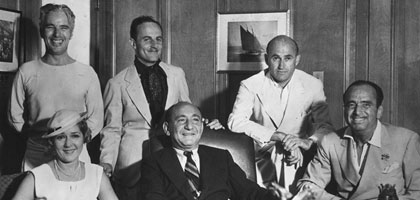United Artists and the Great Features
1923-1940

In 1919, the four biggest figures in the American Film Industry - Mary Pickford, Douglas Fairbanks, the director D.W.Griffith and Chaplin - seeing the vast profits that distributors were making out of their films, set up their own distribution organisation, United Artists. "The lunatics," it was said, "have taken over the asylum". Chaplin, tied up with his First National contract, was the last of the partners to offer a film for distribution. This was A Woman of Paris (1923), a dramatic comedy designed to launch Edna Purviance as a serious actress. Chaplin himself appeared only in an uncredited walk-on as a station porter. The film was hailed by the critics for its style and innovation - anticipating the Lubitsch brand of sophisticated comedy - and for the performances of Purviance and the comparative newcomer Adolphe Menjou. The public however rejected a Chaplin film without Chaplin himself, and it proved his biggest failure and a set-back for United Artists.
The disappointment was off-set by the triumph (both critical and commercial) of his last four great silent features. The Gold Rush (1925) discovered comedy in such improbable themes as the hunger and deprivation of 1890s gold-miners, and cannibalism; The Circus (1928), despite difficulties - both personal and professional - during production, was a brilliant blend of high comedy and sentiment. City Lights (1931), the story of the Tramp's love for a blind flower-girl, is often rated his greatest work; the American critic James Agee called the final scene, "the greatest piece of acting and the highest moment in movies". In Modern Times (1936) Chaplin took a satirical swipe at production-line factory methods of the Ford type - attracting the first criticisms that the comedian was taking on the mantle of philosopher. The last two films were remarkable for being pure silent films (with synchronised musical accompaniment and occasional sound effects), made long after talking pictures were almost universally established. Chaplin astonished the public in these films with a new gift. He had always been versatile - as producer, director, writer, director and star of his films. Now he also proved himself an inspired composer whose scores were to give melodies like "Smile" and "Eternally" to the permanent popular repertory.